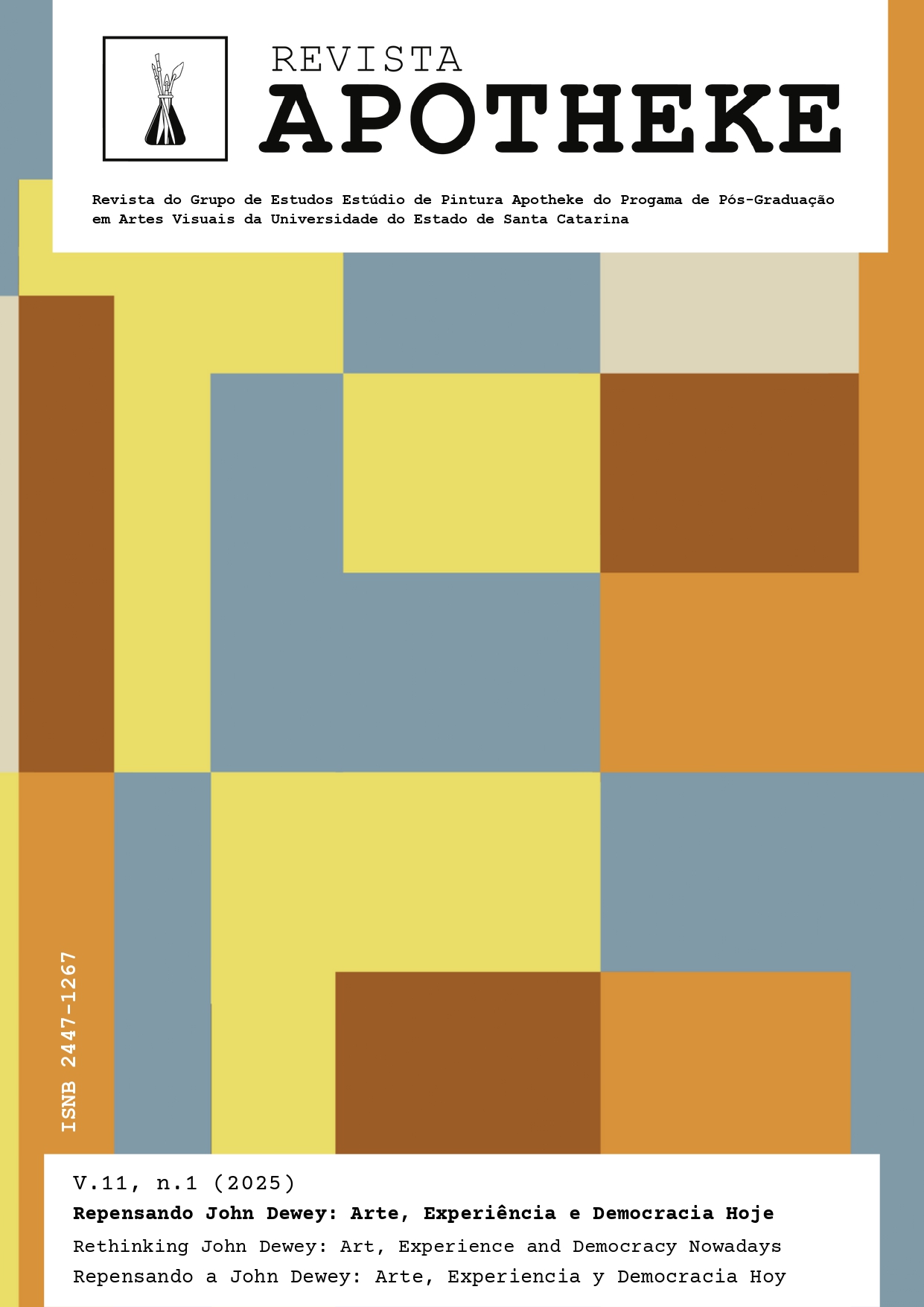Experiências [im]possíveis: um olhar sobre a experiência, arte e educação
DOI:
https://doi.org/10.5965/244712671112025013Palavras-chave:
Arte, Educação, ExperiênciaResumo
O artigo investiga a experiência como elemento essencial na construção do conhecimento humano, destacando sua relevância para a arte e a educação. Com base em autores como John Dewey (1979), Jorge Larrosa (2002; 2015) e Italo Calvino (1994), o texto discute como a experiência ultrapassa o conhecimento técnico e acadêmico, oferecendo uma perspectiva subjetiva e transformadora da realidade. A pesquisa explora a proposta “Experiência [im]possível”, desenvolvida em um contexto educacional, refletindo sobre a importância da pausa, do sentir e da percepção na sociedade contemporânea. Argumenta-se que a experiência e a arte são formas de resistência ao produtivismo neoliberal, possibilitando um ensino mais sensível e democrático. O estudo conclui que valorizar o saber da experiência é um ato político que resgata a humanidade em um mundo acelerado e mecanizado.
Downloads
Referências
BARBOSA, Ana Mae. A imagem no ensino da arte. São Paulo: Perspectiva, 2007.
CALVINO, Italo. O Universo como Espelho. In: CALVINO, Italo. Palomar. São Paulo: Companhia das Letras, 1994.
DEWEY, John. A arte como experiência. Trad. Vera Ribeiro. São Paulo: Martins Fontes, 2010.
DEWEY, John. Democracia e Educação. 4 ed, São Paulo: Companhia Editora Nacional, 1979a.
DEWEY, John. Experiência e Educação. 2. ed. São Paulo: Companhia Editora Nacional, 1979b.
DUARTE JÚNIOR, João Francisco. O Sentido dos Sentidos. Petrópolis: Vozes, 2010.
FREIRE, Paulo. Pedagogia da autonomia: saberes necessários à prática educativa. 19. ed. São Paulo: Paz e Terra, 1996.
LARROSA, Jorge. Notas sobre a experiência e o saber de experiência. Revista Brasileira de Educação, Rio de Janeiro, n. 19, p. 20-28, jan./abr. 2002. Disponível em: https://www.scielo.br/j/rbedu/a/Ycc5QDzZKcYVspCNspZVDxC. Acesso em: 5 de março. 2025.
LARROSA, Jorge. Tremores: Escritos sobre Experiência. Belo Horizonte: Autêntica Editora, 2015.
SACRISTÁN, José Gimeno; GÓMEZ, Ángel Pérez. Compreender e transformar o ensino. 4. ed. Porto Alegre: Artmed, 1998.
Downloads
Publicado
Como Citar
Edição
Seção
Licença
Copyright (c) 2025 Rebeca Pereira San Martins, Maristani Polidori Zamperetti

Este trabalho está licenciado sob uma licença Creative Commons Attribution-NonCommercial 4.0 International License.
Os autores de trabalhos submetidos à Revista APOTHEKE autorizam sua publicação em meio físico e eletrônico, unicamente para fins acadêmicos, podendo ser reproduzidos desde que citada a fonte. Os mesmos, atestam sua originalidade, autoria e ineditismo.
Os artigos publicados pela revista são de uso gratuito, destinados a aplicações
acadêmicas e não comerciais. Os direitos autorais são todos cedidos à revista. Os artigos cujos autores são identificados representam a expressão do ponto de vista de seus autores e não a posição oficial da Revista Apotheke. O(s) autor(es) se compromete(m) a sempre que publicar material referente ao artigo publicado na Revista Apotheke mencionar a referida publicação da seguinte forma:
"Este artigo foi publicado originalmente pela revista Apotheke em seu volume (colocar o volume), número (colocar o número) no ano de (colocar o ano) e pode ser acessado em: http://www.revistas.udesc.br/index.php/APOTHEKE/index"
É responsabilidade dos autores a obtenção da permissão por escrito para usar em seus artigos materiais protegidos pela Lei de Direitos Autorais. A revista Apotheke não é responsável por quebras de direitos autorais feitas por seus colaboradores.
Os autores mantêm os direitos autorais e concedem à revista o direito de primeira publicação, com o trabalho licenciado sob Licença Creative Commons do tipo atribuição BY-NC:
Atribuição (BY): os licenciados têm o direito de copiar, distribuir, exibir e executar a obra e fazer trabalhos derivados dela, conquanto que deem créditos devidos ao autor ou licenciador, na maneira especificada por estes.
Uso Não comercial (NC): os licenciados podem copiar, distribuir, exibir e executar a obra e fazer trabalhos derivados dela, desde que sejam para fins não comerciais.
Após a publicação dos artigos, os autores permanecem com os direitos autorais e de republicação do texto.




